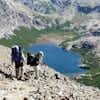Volunteering in Patagonia: FAQs
-
Why Patagonia?
Patagonia is a vast place, with some of the most pristine landscapes in the world that need to be protected. Although efforts have been made to protect land in Chile and Argentina through the creation of national parks, there's still a lot more work to be done to protect and rebuild ecosystems as well educate people about the need to care for their surroundings.
For example, over New Year 2011, a hiker caused a fire in the western part of Torres del Paine National Park that spread rapidly along the eastern shore of Lake Grey. The fire was extinguished after several days but resulted in many thousands of acres of burnt forests. Find out more about what's being done to repair the damage in Torres del Paine below.
-
What can I do?
Most programmes ask you to commit to 3-4 weeks minimum on a project to really get involved and make a difference but this can be extended to one or two months if you prefer. Each programme differs in the experience you'll gain, but we can put you in touch with projects that encompass a variety of tasks including:
Ecosystems:
- Huemul tracking, the huemul is a native deer close to extinction and only seen in certain parts of Patagonia
- Removing exotic plants that are threatening native species
- Collecting and planting seeds
- Removing kilometres of fencing from old 'estancias' or sheep ranches, which is arduous but very important
- Organic farming and natural building
Community projects:
- Tutoring children and teenagers
- Operating a community radio
- Teaching and/or assisting at a local library
- Helping at a daycare centre or assisting people with intellectual disabilities
- Supporting communities affected by mining
- Creating animated movies explaining the dangers of metal mining exploitation
-
What is the day to day schedule?
The day to day work asked of you very much depends on the organisation but often the work will be like a standard 9-5 day job, with time for a break and lunch. Some volunteer projects ask for a minimum of 25 hours work per week on certain days of the week, which allows for a level of flexibility.
If this is a big consideration for you, it's best to look at the type of work you'll be doing in a given project, for example, if you're going to be teaching, you'll likely be needed Monday - Friday during school hours. All volunteers get time off to relax and organisations are good at helping you find local clubs to join and giving you information about places to visit and things to do. Please note that projects focused on manual labour or ecosystem restoration will require you to work out in the fields and although you'll get 2 days break each week, this may not be on a Saturday or Sunday.
-
What is Reforestation Patagonia?
Reforestation Patagonia is a wonderful initiative launched in May 2012 to replant the 42,500 hectares of trees which were burnt in the fire in Torres del Paine over New Year 2011. Although inspired by this disaster, it also hopes to replant some of the 7.5 million acres of native forest throughout Patagonia which have been destroyed by fire and human intervention over the last 100 years.
Help Reforest Patagonia reach its target of 1 million trees replanted in 2012, by choosing a species (lenga, nirre, and coigue) and 'planting a tree' yourself. Once a tree has been planted in the virtual forest, you'll receive an email with a certificate of reforestation and a geotagged link to Google Maps that displays the exact location of where their trees will be planted. Each tree costs $4 USD and contributions are made principally through PayPal.
-
What is Voluntourism?
'Voluntourism' is an increasingly popular way for people to travel: by investing their time and/or money in the local economy either by ensuring that they book through local operators, or by getting involved in volunteer projects in the countries that they visit. It has evolved over the last few years in part because people are tired of seeing huge travel companies reap the benefits and have instead become interested in sustainable tourism.
With high unemployment rates, many young people see it as a way of broadening their horizons and gaining life experience. Older people are also getting involved, and volunteer schemes are set up so that anyone can help through giving up their time.
-
How much does it cost?
Voluntourism is sustainable because organisations charge a fee to cover the cost of your accommodation and food whilst you're there whilst others ask you to contribute to the organisation through a larger payment which also covers your costs. This ensures that the volunteer doesn't cost the organisation anything. The cost of living is reasonably low in most of the locations where projects are taking place, so usually, volunteers are happy to provide for themselves for a period. In addition, some organisations use donations from their volunteers solely to promote, sponsor and execute development projects in Patagonia.
-
Do I need to learn Spanish?
For some volunteers, learning Spanish either before or whilst in Patagonia is a big part of the experience. Our volunteer partner offers 1 week to 1-month programmes in Santiago which will give you around 20 hours of Spanish lessons a week. You can supplement this with 'intercambios' or Spanish/English conversations.
Most programmes can accept volunteers with little or no Spanish whereas others ask for a medium to a good level of Spanish in order to join the programme. When you get in touch, let us know your level of Spanish and whether you're interested in classes.
Planning your Volunteering Trip
Volunteering is a fantastic way of exploring a place but also giving something back at the same time. To make the most of your time in Patagonia you may want to consider a volunteer programme as part of a wider tour of Patagonia. We can help plan that trip from start to finish giving you time to volunteer and time to experience the amazing opportunities for trekking in Patagonia or to go kayaking, mountain biking, horse riding or rafting. In addition, we can also give you expert advice on travel to Patagonia or arrange this for you.
For example, a great way of spending your time in Patagonia may be to volunteer in the beautiful region of Aysen, helping to create a new national park, before heading south to do the Torres del Paine W Trek. Alternatively, you could volunteer at a local community radio station in the Chubut Valley in Argentinian Patagonia before heading over to the Bariloche Lake District for a week of white water rafting. Whatever you choose to do, we can help you plan your trip and advise on some of the most exciting adventure activities and routes.
Where to Volunteer in Patagonia
Torres del Paine
Torres del Paine: Supporting the national park. Located in southern Chile,Torres del Paine National Park is often referred to as the gem of Patagonia. With famous landmarks such as 'Las Torres' and the curly granite spires 'Los Cuernos' the national park is famed for its two trekking routes; the W Trek and the Torres del Paine Circuit, allowing you to hike the major valleys and passes, staying in the parks mountain huts (refugios) and camping out under the stars as well.
In Paine you can volunteer with our partners at Conservation VIP to help build sustainable trails in the national park, thus helping conserve these well-trodden paths, whilst taking some time off to hike some of worlds most iconic treks yourself.
In Paine you'll be tasked with:
- Repairing and clearing trails and bridges.
- Carving traditional wooden signs to mark trails inside the park.
- Participating in educational camps and activities with college students.
- Producing newsletters that promote the 'leave no trace' policy of the park.
- Teaching Basic English to local people and Patagonian cowboys.
Chiloé
Chiloé: Helping out at the ranch. A beautiful island in the Chilean Lake District known for its tales of mermaids and fishermen and bubbling hot springs, Chiloé is a great place for hiking and kayaking.
Volunteer work in Chiloé is mainly centred around helping out on the estancia or farm and work includes:
- Looking after the horses and other animals
- Helping in the main house, tourist centre and restaurant (if there is one)
- Acting as a tour guide
- Helping with any ecological projects
Aysén
Aysén: Building a national park. This pristine area of Patagonia is yet to be discovered by the tourists. With few trekking routes, it's a haven for wilderness lodges dotted throughout the region on the edge of Aysén's beautiful lakes and rivers. Aysén is close to the Northern Patagonian Ice Cap and as such it's a wonderful place to see sprawling glaciers close up.
Building a national park is no mean feat but this means that working on this project in the Chacabuco Valley is pretty challenging. Volunteers will get involved in:
- Trail building and ecosystem restoration
- Digging up exotic plant species, moving rocks for trail building and gathering native seeds.
There are more community-based and teaching projects in and around Santiago. If you'd like more information about these just get in touch.

Swoop says
Have you been inspired by voluntourism and want to encourage others to get involved? If you've helped on a project in Patagonia and would like to share your feedback we'd love to hear all about it. If it's ok with you, we may even share it on our blog to help spread the word.
Get involved in Voluntourism
Listen
We'll spend some time listening to your aspirations, then discuss the kind of experience that might suit you.
Match
Next we'll discuss the options, shortlist the best trips for you and present you our impartial recommendations.
Reserve
We'll place a 24 hour hold on your preferred option - without obligation - whilst we talk through the details.
To help us find you the right project, get in touch and let us know the type of volunteering you're interested in, your dates and length of time available, and which part of Patagonia you'd like to be in. We'll then speak to our trusted network of partners in order to find the right project to you and we'll send you more information about the volunteer work, costs, and travel information.
1-855-369-7866




